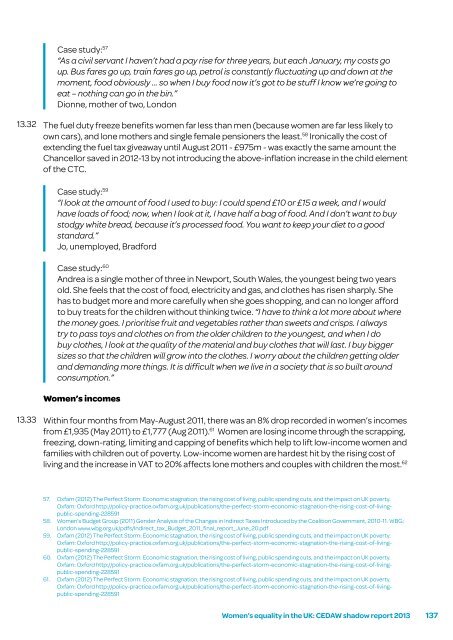Women’s equality in the UK – A health check
Women’s equality in the UK – A health check
Women’s equality in the UK – A health check
You also want an ePaper? Increase the reach of your titles
YUMPU automatically turns print PDFs into web optimized ePapers that Google loves.
13.32<br />
13.33<br />
Case study: 57<br />
“As a civil servant I haven’t had a pay rise for three years, but each January, my costs go<br />
up. Bus fares go up, tra<strong>in</strong> fares go up, petrol is constantly fluctuat<strong>in</strong>g up and down at <strong>the</strong><br />
moment, food obviously … so when I buy food now it’s got to be stuff I know we’re go<strong>in</strong>g to<br />
eat <strong>–</strong> noth<strong>in</strong>g can go <strong>in</strong> <strong>the</strong> b<strong>in</strong>.”<br />
Dionne, mo<strong>the</strong>r of two, London<br />
The fuel duty freeze benefits women far less than men (because women are far less likely to<br />
own cars), and lone mo<strong>the</strong>rs and s<strong>in</strong>gle female pensioners <strong>the</strong> least. 58 Ironically <strong>the</strong> cost of<br />
extend<strong>in</strong>g <strong>the</strong> fuel tax giveaway until August 2011 - £975m - was exactly <strong>the</strong> same amount <strong>the</strong><br />
Chancellor saved <strong>in</strong> 2012-13 by not <strong>in</strong>troduc<strong>in</strong>g <strong>the</strong> above-<strong>in</strong>flation <strong>in</strong>crease <strong>in</strong> <strong>the</strong> child element<br />
of <strong>the</strong> CTC.<br />
Case study: 59<br />
“I look at <strong>the</strong> amount of food I used to buy: I could spend £10 or £15 a week, and I would<br />
have loads of food; now, when I look at it, I have half a bag of food. And I don’t want to buy<br />
stodgy white bread, because it’s processed food. You want to keep your diet to a good<br />
standard.”<br />
Jo, unemployed, Bradford<br />
Case study: 60<br />
Andrea is a s<strong>in</strong>gle mo<strong>the</strong>r of three <strong>in</strong> Newport, South Wales, <strong>the</strong> youngest be<strong>in</strong>g two years<br />
old. She feels that <strong>the</strong> cost of food, electricity and gas, and clo<strong>the</strong>s has risen sharply. She<br />
has to budget more and more carefully when she goes shopp<strong>in</strong>g, and can no longer afford<br />
to buy treats for <strong>the</strong> children without th<strong>in</strong>k<strong>in</strong>g twice. “I have to th<strong>in</strong>k a lot more about where<br />
<strong>the</strong> money goes. I prioritise fruit and vegetables ra<strong>the</strong>r than sweets and crisps. I always<br />
try to pass toys and clo<strong>the</strong>s on from <strong>the</strong> older children to <strong>the</strong> youngest, and when I do<br />
buy clo<strong>the</strong>s, I look at <strong>the</strong> quality of <strong>the</strong> material and buy clo<strong>the</strong>s that will last. I buy bigger<br />
sizes so that <strong>the</strong> children will grow <strong>in</strong>to <strong>the</strong> clo<strong>the</strong>s. I worry about <strong>the</strong> children gett<strong>in</strong>g older<br />
and demand<strong>in</strong>g more th<strong>in</strong>gs. It is difficult when we live <strong>in</strong> a society that is so built around<br />
consumption.”<br />
<strong>Women’s</strong> <strong>in</strong>comes<br />
With<strong>in</strong> four months from May-August 2011, <strong>the</strong>re was an 8% drop recorded <strong>in</strong> women’s <strong>in</strong>comes<br />
from £1,935 (May 2011) to £1,777 (Aug 2011). 61 Women are los<strong>in</strong>g <strong>in</strong>come through <strong>the</strong> scrapp<strong>in</strong>g,<br />
freez<strong>in</strong>g, down-rat<strong>in</strong>g, limit<strong>in</strong>g and capp<strong>in</strong>g of benefits which help to lift low-<strong>in</strong>come women and<br />
families with children out of poverty. Low-<strong>in</strong>come women are hardest hit by <strong>the</strong> ris<strong>in</strong>g cost of<br />
liv<strong>in</strong>g and <strong>the</strong> <strong>in</strong>crease <strong>in</strong> VAT to 20% affects lone mo<strong>the</strong>rs and couples with children <strong>the</strong> most. 62<br />
57. Oxfam (2012) The Perfect Storm: Economic stagnation, <strong>the</strong> ris<strong>in</strong>g cost of liv<strong>in</strong>g, public spend<strong>in</strong>g cuts, and <strong>the</strong> impact on <strong>UK</strong> poverty.<br />
Oxfam: Oxford http://policy-practice.oxfam.org.uk/publications/<strong>the</strong>-perfect-storm-economic-stagnation-<strong>the</strong>-ris<strong>in</strong>g-cost-of-liv<strong>in</strong>gpublic-spend<strong>in</strong>g-228591<br />
58. <strong>Women’s</strong> Budget Group (2011) Gender Analysis of <strong>the</strong> Changes <strong>in</strong> Indirect Taxes Introduced by <strong>the</strong> Coalition Government, 2010-11. WBG:<br />
London www.wbg.org.uk/pdfs/Indirect_tax_Budget_2011_f<strong>in</strong>al_report_June_20.pdf<br />
59. Oxfam (2012) The Perfect Storm: Economic stagnation, <strong>the</strong> ris<strong>in</strong>g cost of liv<strong>in</strong>g, public spend<strong>in</strong>g cuts, and <strong>the</strong> impact on <strong>UK</strong> poverty.<br />
Oxfam: Oxford http://policy-practice.oxfam.org.uk/publications/<strong>the</strong>-perfect-storm-economic-stagnation-<strong>the</strong>-ris<strong>in</strong>g-cost-of-liv<strong>in</strong>gpublic-spend<strong>in</strong>g-228591<br />
60. Oxfam (2012) The Perfect Storm: Economic stagnation, <strong>the</strong> ris<strong>in</strong>g cost of liv<strong>in</strong>g, public spend<strong>in</strong>g cuts, and <strong>the</strong> impact on <strong>UK</strong> poverty.<br />
Oxfam: Oxford http://policy-practice.oxfam.org.uk/publications/<strong>the</strong>-perfect-storm-economic-stagnation-<strong>the</strong>-ris<strong>in</strong>g-cost-of-liv<strong>in</strong>gpublic-spend<strong>in</strong>g-228591<br />
61. Oxfam (2012) The Perfect Storm: Economic stagnation, <strong>the</strong> ris<strong>in</strong>g cost of liv<strong>in</strong>g, public spend<strong>in</strong>g cuts, and <strong>the</strong> impact on <strong>UK</strong> poverty.<br />
Oxfam: Oxford http://policy-practice.oxfam.org.uk/publications/<strong>the</strong>-perfect-storm-economic-stagnation-<strong>the</strong>-ris<strong>in</strong>g-cost-of-liv<strong>in</strong>gpublic-spend<strong>in</strong>g-228591<br />
<strong>Women’s</strong> <strong>equality</strong> <strong>in</strong> <strong>the</strong> <strong>UK</strong>: CEDAW shadow report 2013 137


